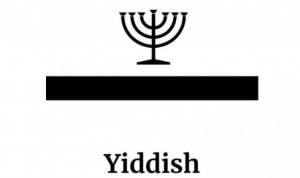Language/Eastern-yiddish
Hi Polyglots! 😃
Welcome to the Eastern Yiddish learning page!
You will find below many free resources to learn and practice this language.
Enjoy your learning journey with Polyglot Club! 😊
Facts about Eastern Yiddish[edit | edit source]
- Language code (ISO 639-3):
ydd - Autonyms (how to write "Eastern Yiddish" in Eastern Yiddish):
ייִדיש, יידיש or אידיש, yidish or idish, ייִדיש-טײַטש, Yidish-Taytsh - Other names for "Eastern Yiddish":
Judeo-German, Yiddish - The Eastern Yiddish language is spoken in:
Ukraine
Yiddish is a West Germanic language historically spoken by Ashkenazi Jews. It originated during the 9th century in Central Europe, providing the nascent Ashkenazi community with a High German-based vernacular fused with many elements taken from Hebrew (notably Mishnaic) and to some extent Aramaic; most varieties also have substantial influence from Slavic languages, and the vocabulary contains traces of influence from Romance languages.[8][9][10] Yiddish writing uses the Hebrew alphabet.
In the 1990s, there were around 1.5–2 million speakers of Yiddish, mostly Hasidic and Haredi Jews.[citation needed] In 2012, the Center for Applied Linguistics estimated the number of speakers to have had a worldwide peak at 11 million (prior to World War II), with the number of speakers in the United States and Canada then totaling 150,000.[11] An estimate from Rutgers University gives 250,000 American speakers, 250,000 Israeli speakers, and 100,000 in the rest of the world (for a total of 600,000).
Sources[edit | edit source]
https://en.wikipedia.org/wiki/Yiddish
Yiddish Dictionaries[edit | edit source]
• YiddishDictionaryOnline (YDO): Yiddish-English Dictionary
• A Yiddish cultural dictionary for the 21st century, by Dovid Katz
• University of Kentucky: Yiddish-English dictionary (Latin characters)
• Verterbukh.org: Yiddish-English & French dictionary (free registration required)
• YiDD: Yiddish dialect dictionary
• Speaking of Yiddish: some Yiddish words used in English, by Hugh Rawson (2013): I & II
• Groyser verterbukh fun der Yidisher shprakh: Great dictionary of the Yiddish language, by Yehudah Yofe & Mark Yudel (1961): I & II - III - IV
• Yiddish-English dictionary & English-Yiddish by Uriel Weinreich (1968) + another version
• Yiddish-English-Hebrew Dictionary by Alexander Harkavy (1928)
• English-Yiddish Dictionary & Yiddish-English, by Alexander Harkavy + another version (1910)
• English-Yiddish Encyclopedic Dictionary by Paul Abelson (1915) A-G G-R S-Z
• Sieben Sprachen Wörterbuch: German-Polish-Russian-Byelorussian-Lithuanian-Latvian-Yiddish dictionary, edited by the Oberbefehlshaber Ost (Supreme Commander of all German Forces in the East) (1918)
• Русско-еврейский (идиш) словарь: Russian-Yiddish dictionary (1984)
• Lessons in conversational Yiddish (1967)
• Yidisher gramen-leksikon: Yiddish rhyming lexicon, by Nahum Stutchkoff (1931)
• Shemot Devarim: Old Yiddish-Hebrew-Latin-German glossary (1542)
• Affective borrowing from Yiddish in colloquial American English by Jacob Ornstein-Galicia, in Meta, journal des traducteurs (1992)
• Loan words in the English of Modern Orthodox Jews: Yiddish or Hebrew? by Sarah Benor (2000)
• Yiddish loanwords in Dutch by Jenia Gutova (2010)
Sources[edit | edit source]
https://www.lexilogos.com/english/yiddish_dictionary.htm
Free Eastern Yiddish Lessons[edit | edit source]
Language Exchange[edit | edit source]
Forum[edit | edit source]
Tools[edit | edit source]
Marketplace[edit | edit source]
Last Lessons[edit | edit source]
Useful phrases — How to Say Hello and Greetings — Numbers נומערן — Adjectives אַדזשיקטיווז — Nouns נאַונז — Questions פֿראגן — Colors — Alphabet and Pronunciation

